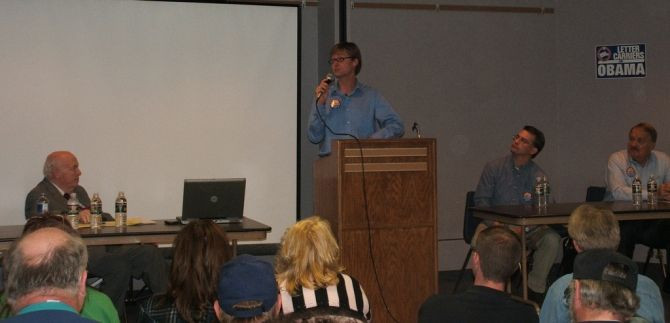Group Settings Can Alter Expressions of Intelligence, Especially in Women

Researchers have found that small groups such as jury deliberations, collective bargaining sessions, and cocktail parties, can alter the expression of IQ in some people.
"You may joke about how committee meetings make you feel brain dead, but our findings suggest that they may make you act brain dead as well," said Read Montague, director of the Human Neuroimaging Laboratory and Computational Psychiatry Unit at the Virginia Tech Carilion Research Institute.
Montague led the study, which was published in the journal Philosophical Transactions of the Royal Society B.
Using functional magnetic resonance imaging, fMRI, the researchers determined how the brain processes information about social status in small groups and how perceptions of that status affect expressions of cognitive capacity.
"We started with individuals who were matched for their IQ," said Montague.
"Yet when we placed them in small groups, ranked their performance on cognitive tasks against their peers, and broadcast those rankings to them, we saw dramatic drops in the ability of some study subjects to solve problems. The social feedback had a significant effect."
In other words, a subject’s expressed level of intelligence can change in different social settings.
"Our study highlights the unexpected and dramatic consequences even subtle social signals in group settings may have on individual cognitive functioning," said lead author Kenneth Kishida, a research scientist with the Virginia Tech Carilion Research Institute.
"And, through neuroimaging, we were able to document the very strong neural responses that those social cues can elicit."
Methodology
The study consisted of subjects from two universities that were given a standard IQ test. The results of the test were not viewed until after a series of ranked group IQ tasks.
Test takers, in groups of five, received information about how their performances compared to those of the other group members, the authors explained.
Although the test subjects had similar IQ scores, a mean of 126, compared to the national average of 100, the authors found that the subjects showed a range of test performance results after the ranked group IQ tasks, as some individuals level of intelligence was affected by signals about their status within a small group.
To determine what was going on in the brain during the observed changes in IQ expression, the researchers divided the subjects in two groups based on their final IQ results, those who scored above the median and those who scored below the median, and scanned their brain using fMRI while they participated in the task.
Among many of the researcher’s findings, they found that dynamic responses occurred in multiple brain regions that are believed to be involved in emotional processing, problem solving, reward and pleasure.
They also found that all subjects had an initial increase in amygdala activation and diminished activity in the prefrontal cortex, which both corresponded with a lower problem-solving ability.
The high-performing group showed decreased amygdala activation and increased prefrontal cortex activation, associated with an increased ability to solve more difficult problems, by the end of the task.
"So much of our society is organized around small-group interactions," said Kishida.
"Understanding how our brains respond to dynamic social interactions is an important area of future research. We need to remember that social dynamics affect not just educational and workplace environments, but also national and international policy-making bodies, such as the U.S. Congress and the United Nations."
Published by Medicaldaily.com



























